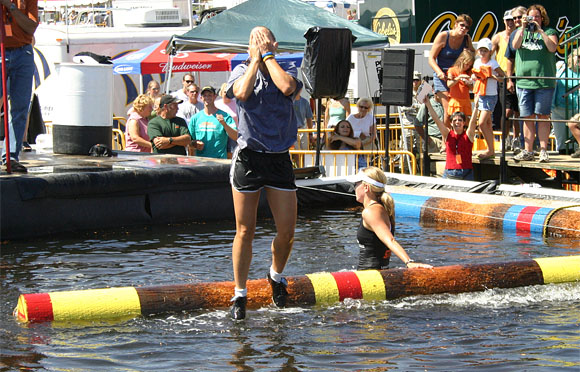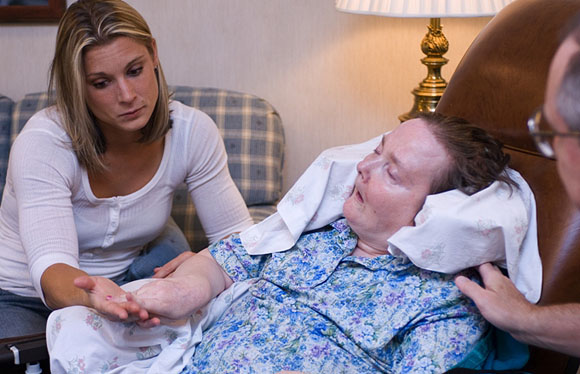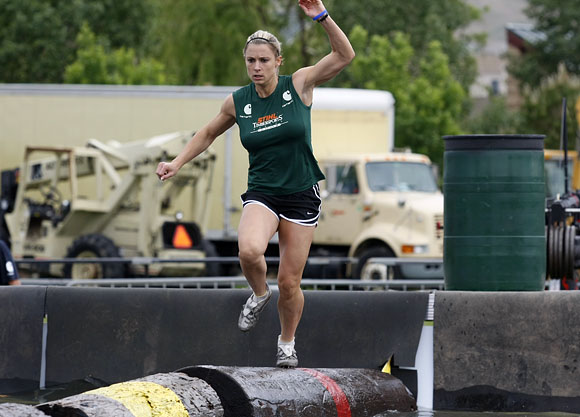Racing for the Cure
Lumberjack sports champ and Huntington's advocate Shana Martin attacks both with gusto
By Sam Eifling
ESPNOutdoors.com
 Shana Martin defeats Lizzy Hoeschller for her first logrolling world title in 2006.
Shana Martin defeats Lizzy Hoeschller for her first logrolling world title in 2006.
The emotion's all there in the photo of Shana Martin winning her first logrolling world title, in 2006 — you just can't see it. Her finals opponent, Lizzie Hoeschler, already is waist-deep in water, turning away, her left hand on the top of the cleat-frayed log. Martin is stepping off the log in the direction of the camera. Her right foot is just beginning to break the water's surface. Her head is tilted back slightly in the direction of the sun. Her hands cover her face, chin to eyes.
Her victory had just hit her. She hadn't expected to win, hadn't prepared herself for the weight of it. This was the woman who scoffed when she saw champions tear up in the past: It's only logrolling. But in that instant she felt her life fold back onto her like a breaker: logrolling at the YMCA as a girl, family vacations to watch the pros compete in Hayward, Wis., all her training, all her friends …
In that moment, when her whole life seemed to converge on one split second, she thought, too, of her mother, Debby Martin, who, with Shana's father, George Martin, had for years attended her practices and competitions. It became harder and harder, though, through the progression of the Huntington's Disease that had afflicted Debby from the time Shana was an infant. The last time Debby left her nursing home was 2004, to watch Shana compete at the Great Outdoor Games in their hometown Madison, Wis.
She never thought she would be the one to cry, but yeah, Martin bawled her eyes out.
In the stands that day was Martin's first logrolling coach from the Y, John Hallett, who had helped guide Martin to become one of the best logrollers and boomrunners of her generation. He, too, was overcome with the moment. What sticks with him was her post-match interview.
"She basically got up there and said, 'I did this for my mom,'" he recalls now. "'She couldn't be here today. But I don't want anyone to forget about my mom.'"
 Shana Martin looks after her mother, Debby Martin, who has been afflicted with Huntington's Disease from the time Shana was an infant.
Shana Martin looks after her mother, Debby Martin, who has been afflicted with Huntington's Disease from the time Shana was an infant.
Today Shana Martin is 29 and leads the sort of life that makes you wonder just what exactly you've been doing with your time. The three-time defending International Log Rolling Association logrolling champion, one-time ILRA boomrunning champ, a fitness competitor, a personal trainer, the manager of a gym in Madison, Wis., is today the president of the Wisconsin chapter of the Huntington's Disease Society of America and national spokesperson for the HDSA. As such, it is her job to tell people about Huntington's, and to help raise money to put toward finding a cure.
Here's how Martin found out about the disease. She was very young, probably just old enough to understand some of what was happening. Her mother was diagnosed. Her father sat her down with binders full of information from the HDSA. He told her to take heart in the voluminous research. He said they will find a cure some day.
Then, Martin recalls, he flipped a coin on the bed and said, "These are your chances of getting this disease as well."
Ever since then, Martin has lived under that coin's edge. On one side, there is the athlete, the swimsuit model, the leader, a person so dedicated to health that she indulges in nothing more self-destructive than the rare glass of wine, on her way to a long and joyous life. On the other side, there is the afflicted shadow of the disease: a dark path of tremors and contortions — the loss of body control — and anger, silence, isolation and mental degradation — the loss of self.
Twenty-four years after her diagnosis, and 29 years after she first started showing Huntington's symptoms, Martin's mom is now in the advanced stages of the disease. She cannot speak, nor offer so much as eye contact. But Martin reaches to her all the same. On visits to the nursing home, she tells her mother everything, on down to her dating life, and they watch movies. After a string of picking movies for herself, and watching her mom fall asleep to them, Martin last week played one of her mother's old favorites: "Carousel," the musical. Debby stayed awake the whole time — a sign, to Martin, that her mother can still engage with the world.
"Huntington's is a horrible, long, drawn-out process that doesn't just affect the person that has it," Martin says. "It tears apart the entire family, the entire community. They're slowly dying, and slowly losing their job, and slowly becoming a different person.
"In my mind, from my personal experiences, this disease is the most horrendous thing that can happen to a family."
In a roundabout way, it was Huntington's that brought Martin to lumberjack sports. Her parents sought to make her life as normal and social as possible, and from the time Martin was 5 years old, she was enrolled in YMCA ballet, gymnastics and logrolling classes. "Those were purely for my sanity," she says. She sprinted in high school and became the first female pole vaulter at the University of Wisconsin, earning a scholarship competing in Big Ten meets.
When Martin is asked whether her fierce drive to hone her physical form is her form of a pre-emptive strike against a debilitating disease, she says kindly, but with a twinge of exasperation: "A lot of people have drawn that conclusion." Sport happened to be her outlet, she says, but she might have become obsessed with just about anything put in front of her.

Martin is one of the best logrollers and boomrunners of her generation.
The first time Martin won the STIHL TIMBERSPORTS boomrunning title, she rolled in the finals against Mandy Erdmann, whom Martin considered unbeatable. It was Virginia Beach, Va., in 2005. "The only time she had been beaten was the year before, in the Great Outdoor Games," Martin says. "I said, 'OK, I'll get second place.'"
So instead of stressing out on the day before the finals, Martin spent the day surfing. She entered the match a bit tired, but also relaxed and loose. Then she owned the boom against the champ.
Both she and Hallett attribute her improvements as an athlete to an emotional maturation. Nerves, once her weakness, tend no longer to hamper her. "She's definitely developed that aspect of her personality," Hallett says. "Just get out there and be intensely competitive but also have a good time."
That attitude, in the view of Melissa Worthington, the Great Lakes Regional Director for the HDSA, is what allowed Martin to assume the presidency of the Wisconsin chapter at the age of 27. Since then, Worthington said, fundraising has improved (owing, in part, to a logrolling event Martin organizes) and the board is, Worthington says, "moving."
"She has this ability to just have such a positive energy that people want to jump on board," Worthington says. "It's an infectious energy and it's always positive. You never see Shana have a bad day. It's always done with a smile and done with extra gusto." Martin has dedicated herself to the HDSA since she attended a national conference at 16. At the time, she recalls, the networking for children of Huntington's patients was so slim that she and the handful of other kids at the conference ditched the scheduled sessions to sneak off and just talk to each other. "That's when the whole world opened up for me," Martin says.
All were coping with having a parent with Huntington's, and all knew they stood a 50/50 chance of eventually developing the disease themselves. Year after year, the youth attendance grew, and out of those gatherings came a Huntington's support group called the National Youth Alliance. (Crediting Martin with helping to start the Alliance, Worthington says: "That's frankly a really big deal.")
The young members of the network, help one another and hold fundraisers to bring as many of them as possible to conferences. And they watch out for each other. Only they know the omnipresent dread that symptoms might appear.
There is a test now, that will predict the disease, to tell a person whether that coin is heads or tails. Martin, though, steadfastly has declined it.
"It's a very personal decision," Martin says. "Having lived with the disease my whole life, I was lucky enough to know my risk for it. If I took the test and got a positive result, I don't think I would deal with that well. I'm not going to be too happy about it."
Ask Martin what her most memorable athletic moments are, and you'll get a litany of fine times, from that title over Erdmann (a "big highlight") to her trip to New Zealand this spring to logroll in a lumberjack show. Her title last summer — that definitely makes the list. That was only a few weeks after she blew out her ACL in a fitness competition (an injury she managed to duplicate late last year, during a routine, and yet finish the event).
She had to immobilize her leg for a week; just before the competition, she found it unstable but also in surprisingly little pain. Her doctor told her she could logroll, but not boom run. Knowing she'd need surgery anyway, she said to hell with it and ran the boom, too. She won both events — including her third world title in logrolling.
That first world championship, that photo-frozen title that Hallett so vividly remembered — that was another milestone. Of course it was. That her mom would miss her meets was an inevitability, but that didn't make it any easier to win without her in the stands.
"For me, it was unreal," Martin says. "I never, ever thought I would be world champion. When I won, all these emotions came out. And just about everything I do is for my mom."
STIHL and STIHL® TIMBERSPORTS® are registered trademarks of STIHL.








